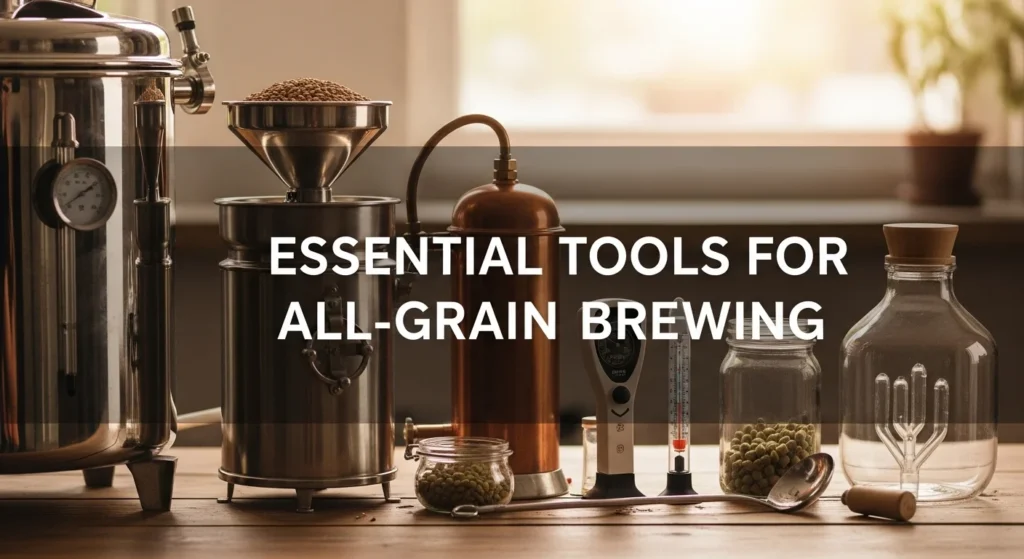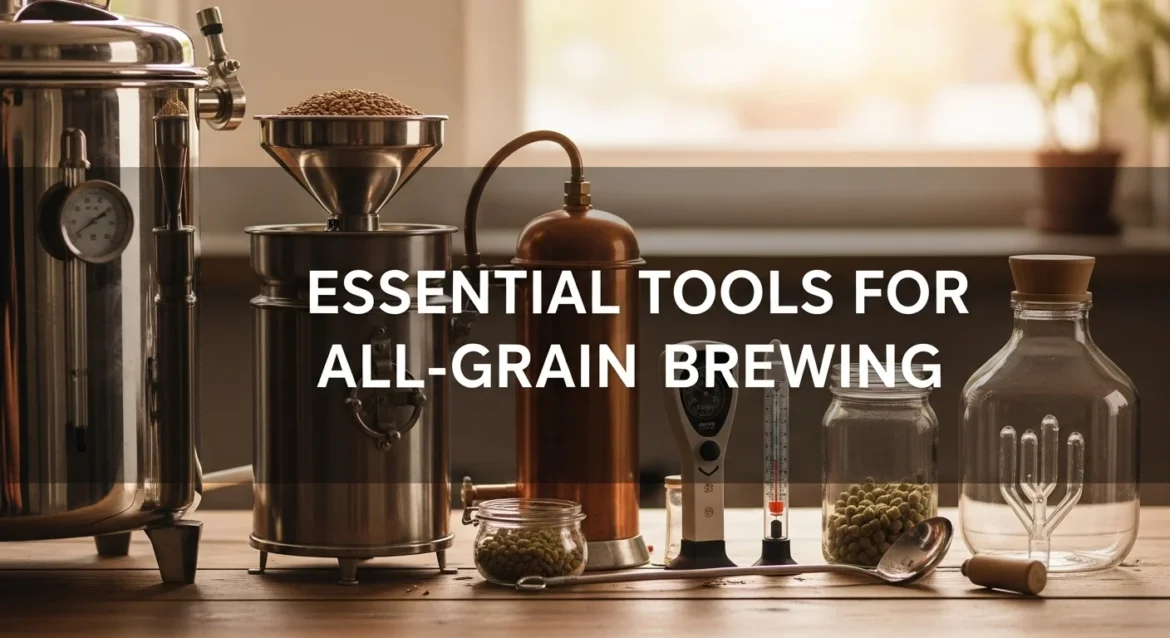Essential Tools for All-Grain Brewing Master all-grain brewing with our comprehensive guide to essential tools and equipment. Learn about mash tuns, lauter systems, grain mills, and specialized brewing equipment needed for successful all-grain beer production.

All-grain brewing represents the pinnacle of homebrewing craftsmanship, enabling complete control over every aspect of beer creation while delivering superior flavor complexity and brewing satisfaction. After transitioning hundreds of brewers from extract to all-grain methods over the past decade, I can confidently state that success depends entirely on having the right tools and understanding their proper application throughout the complex all-grain brewing process.
My all-grain journey began with frustrating attempts using inadequate equipment that resulted in poor efficiency, stuck mashes, and disappointing beer quality. The breakthrough came when I systematically acquired proper tools and learned their optimal usage, transforming my brewing from mediocre extract reproduction to exceptional beer creation that showcased the full potential of quality malted grains.
This comprehensive guide examines every essential tool required for successful all-grain brewing, from basic mashing equipment to specialized accessories that ensure consistent results. Understanding proper equipment selection and usage enables brewers to achieve professional-quality results while avoiding common pitfalls that compromise efficiency and beer quality.
Whether you’re making your first transition to all-grain brewing or optimizing existing equipment for better performance, mastering these essential tools ensures every batch delivers the superior quality and brewing satisfaction that makes all-grain brewing worthwhile.
Understanding All-Grain Brewing Process Requirements
All-grain brewing involves multiple distinct phases including mashing, lautering, boiling, and cooling that each require specific tools and equipment to achieve optimal results while maintaining efficiency throughout the entire process.
Mashing Phase Equipment Needs
The mashing process converts grain starches into fermentable sugars through enzymatic action at controlled temperatures between 145-158°F for approximately one hour. This critical phase requires precise temperature control, adequate grain holding capacity, and effective mixing capability.
Lautering and Sparging Requirements
Lautering separates clear wort from grain solids through filtration while sparging rinses additional sugars from spent grain using hot water. These processes demand specialized filtration systems and precise flow control to maximize extraction efficiency.
Grain Preparation and Processing
Proper grain crushing exposes starches while preserving husk integrity for effective lautering. Grain mills must achieve optimal crush consistency with adjustable gap settings that balance extraction efficiency with filtration performance.
Temperature Control and Monitoring
All-grain brewing requires precise temperature management throughout mashing, sparging, and boiling phases. Understanding temperature relationships guides equipment selection for reliable thermal control and accurate monitoring.
For comprehensive all-grain brewing guidance and advanced technique optimization, explore the detailed resources at BrewMyBeer’s all-grain brewing guides, where professional brewing expertise meets practical homebrewing applications.
Mash Tun: The Heart of All-Grain Brewing
The mash tun serves as the primary vessel for grain mashing where crushed grain and hot water combine to create optimal conditions for enzymatic starch conversion into fermentable sugars.
Capacity and Size Requirements
Mash tun capacity should accommodate 1-1.5 quarts of water per pound of grain plus grain volume for typical recipes. A 5-gallon batch using 10-12 pounds of grain requires minimum 20-quart capacity, though larger vessels provide operational flexibility and efficiency.
Insulated Cooler Conversions
Quality insulated coolers make excellent mash tuns through simple modifications including false bottom installation and valve additions. The superior insulation maintains mash temperatures consistently while the food-grade construction ensures safety and durability.
Stainless Steel Kettle Options
Stainless steel mash tuns offer superior durability and heating capability while enabling direct heat application for temperature adjustments. Professional-grade construction provides long-term reliability though at higher initial investment compared to cooler conversions.
False Bottom and Filtration Systems
Effective grain bed filtration requires false bottoms or manifold systems that separate liquid wort from grain solids while preventing stuck mashes. Proper filtration design ensures clear wort collection without grain particle contamination.
Temperature Monitoring Integration
Built-in thermometers or thermowells enable continuous temperature monitoring throughout mashing processes while ensuring optimal enzymatic conditions without requiring vessel opening that compromises temperature stability.
| Mash Tun Type | Capacity Range | Insulation Quality | Heat Source Compatibility | Price Range | Best Application |
|---|---|---|---|---|---|
| Cooler Conversion | 5-15 gallons | Excellent | None (infusion only) | $100-200 | Budget homebrewing |
| SS Kettle Basic | 5-20 gallons | Poor | Gas/Electric | $200-500 | Flexible brewing |
| Insulated SS | 5-15 gallons | Excellent | Direct heat capable | $400-800 | Professional results |
| All-in-One Systems | 5-10 gallons | Good | Integrated electric | $800-2000 | Convenience focused |
Essential Tools for All-Grain Brewing Lauter Tun and Grain Separation Systems
Lauter tuns enable efficient wort separation from spent grain through specialized filtration systems that maintain grain bed integrity while collecting clear wort for boiling.
Dedicated Lauter Tun Design
Separate lauter tuns optimize grain bed depth and flow characteristics for superior wort clarity and extraction efficiency. The cylindrical design with 12-inch grain bed depth provides ideal filtration conditions while preventing channeling.
Combined Mash/Lauter Systems
Multi-purpose vessels serve both mashing and lautering functions through integrated false bottom systems that enable single-vessel operation. This approach reduces equipment requirements while maintaining adequate performance for most homebrewing applications.
False Bottom Specifications
Quality false bottoms feature 0.02-0.03 inch perforations with 23% open area that provides optimal flow rates while preventing grain particle passage. Stainless steel construction ensures durability while food-grade materials maintain brewing safety.
Manifold Filtration Alternatives
Slotted pipe manifolds offer cost-effective filtration through copper or stainless steel tube systems with precise slot sizing that balances flow rate with filtration effectiveness.
Recirculation and Vorlauf Systems
Proper vorlauf procedures clarify initial runoff through gentle recirculation that compacts grain bed filtration while achieving bright wort collection for optimal beer clarity.
Grain Mill: Optimal Crush for Maximum Efficiency
Proper grain crushing maximizes extraction efficiency while maintaining husk integrity essential for effective lautering and preventing stuck mashes during all-grain brewing operations.
Two-Roller Mill Designs
Adjustable two-roller mills provide optimal crush control through precise gap settings approximately equivalent to two credit card thicknesses. Quality mills feature knurled rollers and sturdy construction that ensures consistent crushing performance.
Gap Adjustment and Calibration
Proper mill gap settings balance extraction efficiency with lautering performance by cracking grain kernels while preserving husk structure. Understanding gap calibration prevents over-crushing that creates stuck mashes or under-crushing that reduces efficiency.
Electric vs. Manual Operation
Electric grain mills provide convenience and consistency for frequent brewers while manual alternatives offer portability and lower costs for occasional use. Motorized systems ensure uniform crushing speed that improves crush consistency.
Hopper Capacity and Feed Systems
Adequate hopper capacity reduces refilling frequency while gravity-fed systems ensure consistent grain flow through mill rollers. Understanding capacity requirements guides mill selection for specific batch sizes and brewing frequency.
Alternative Crushing Methods
Borrowed or shared mills provide cost-effective access to proper crushing while mobile crushing services offer professional results without equipment investment. Commercial grain crushing provides consistency though requires usage within days to prevent staling.
Hot Liquor Tank and Water Management
Hot liquor tanks provide heated water for mashing and sparging while maintaining proper temperatures throughout all-grain brewing processes that require significant water volumes at specific temperatures.
Capacity Requirements and Sizing
Hot liquor tanks should accommodate total brewing water needs including mash water and sparge water volumes. Typical 5-gallon batches require 8-10 gallons total water capacity for complete brewing sessions.
Heating Systems and Integration
Electric heating elements or gas burner compatibility enables efficient water heating while thermostatic controls maintain target temperatures. Understanding heating capacity requirements ensures adequate performance for brewing schedules.
Temperature Control and Monitoring
Built-in temperature monitoring enables precise water temperature management while avoiding overheating that affects water chemistry or creates safety hazards during handling and transfer operations.
Multi-Purpose Vessel Design
Many brewers utilize boil kettles as hot liquor tanks through sequence management that optimizes equipment utilization while reducing total vessel requirements and associated costs.
Water Treatment Integration
Hot liquor tanks accommodate water treatment additions including mineral adjustments and chlorine removal that optimize brewing water chemistry for specific beer styles and brewing requirements.
Specialized Measurement and Testing Equipment
Precise measurement and testing ensure optimal all-grain brewing results through systematic monitoring of critical parameters including temperature, gravity, and pH throughout brewing processes.
Digital Thermometry and Temperature Probes
Accurate temperature measurement guides mashing and sparging while waterproof digital thermometers provide reliable readings in wet brewing environments. Understanding thermometer accuracy ensures proper enzymatic conditions.
pH Meters and Water Chemistry
Mash pH significantly affects enzymatic efficiency while proper pH measurement enables optimization through water treatment and acid additions. Quality pH meters ensure accurate readings for consistent brewing results.
Hydrometer and Refractometer Usage
Gravity measurements throughout brewing quantify extraction efficiency while enabling process optimization and troubleshooting. Understanding gravity relationships guides all-grain brewing improvement.
Iodine Testing for Conversion
Iodine testing confirms complete starch conversion during mashing while preventing premature lautering that reduces efficiency. Proper testing techniques ensure optimal sugar extraction.
Timer and Process Management
Digital timers coordinate multiple brewing phases while ensuring proper rest periods and temperature maintenance that optimize enzymatic activity throughout complex all-grain brewing schedules.
Heat Sources and Energy Systems
Adequate heating capacity ensures efficient all-grain brewing through rapid heating and sustained boiling that accommodates larger wort volumes typical in all-grain processes.
Propane Burner Systems
High-BTU propane burners provide rapid heating capability for large brewing vessels while enabling outdoor brewing that prevents indoor moisture and odor issues. Understanding BTU requirements guides burner selection.
Electric Brewing Systems
Electric heating elements enable indoor brewing while providing precise temperature control through thermostatic regulation. Electric systems require adequate electrical service and proper safety considerations.
Induction Heating Technology
Induction systems offer rapid heating with precise control while providing energy efficiency and safety advantages. Induction compatibility requires magnetic-bottom vessels for optimal performance.
Heat Source Integration
Multi-vessel brewing requires coordinated heating systems that accommodate simultaneous heating needs while managing energy costs and operational complexity.
Cooling and Post-Boil Equipment
Rapid wort cooling prevents contamination while improving beer clarity through proper break formation and reduced exposure time during vulnerable cooling phases.
Immersion Chiller Performance
Immersion chillers provide reliable cooling through heat exchange coils placed directly in boiling wort. Copper construction offers superior heat transfer while stainless steel provides durability and easy cleaning.
Counterflow Chiller Efficiency
Counterflow systems enable continuous cooling during transfer while providing superior cooling rates through optimized heat exchange design. Understanding flow balancing ensures optimal performance.
Plate Chiller Technology
Plate heat exchangers maximize cooling efficiency through multiple plate heat exchange that provides rapid cooling with minimal water usage. Professional-grade systems deliver commercial cooling performance.
Whirlpool and Trub Separation
Proper whirlpool techniques separate break material from clear wort while improving cooling efficiency and beer clarity through effective hot and cold break removal.
Transfer and Pumping Systems
Efficient liquid transfer systems streamline all-grain brewing while reducing manual handling and contamination risk throughout complex multi-vessel brewing processes.
Gravity-Fed System Design
Elevated vessel arrangements enable gravity transfers while eliminating pump requirements and associated complexity. Understanding height requirements optimizes gravity flow systems.
Pump Selection and Integration
Brewing pumps facilitate liquid transfers and recirculation while enabling automation and improved process control. Food-grade construction ensures safety while adequate flow capacity matches brewing requirements.
Tubing and Connection Systems
High-temperature tubing withstands brewing conditions while sanitary fittings ensure proper connections and easy cleaning. Understanding material compatibility prevents contamination and equipment damage.
Flow Control and Valves
Ball valves and flow control devices enable precise liquid management while preventing overflow and ensuring proper transfer rates throughout brewing processes.
Essential Accessories and Support Equipment
Various accessories optimize all-grain brewing efficiency while ensuring safety and process control throughout complex brewing operations.
Long-Handled Spoons and Paddles
Mash paddles enable effective grain mixing while long handles provide safe operation with hot liquids. Stainless steel construction ensures durability and easy cleaning.
Grain Bags and BIAB Equipment
Brew-in-a-bag systems simplify all-grain brewing through single-vessel operation while maintaining grain separation. Quality grain bags withstand high temperatures and repeated use.
Cleaning and Sanitation Systems
Specialized cleaning equipment maintains brewing sanitation while CIP systems enable thorough equipment cleaning without disassembly. Understanding cleaning protocols ensures consistent sanitation.
Safety Equipment and Protection
Personal protective equipment prevents injury during high-temperature brewing operations while proper ventilation ensures safe indoor brewing environments.
Budget Optimization and Upgrade Strategies
Strategic equipment acquisition spreads costs while building comprehensive all-grain brewing capability through phased implementation and smart purchasing decisions.
Essential vs. Nice-to-Have Equipment
Understanding core equipment requirements enables targeted investment while avoiding unnecessary expenses that don’t significantly improve brewing results or efficiency.
DIY and Conversion Projects
Equipment conversions and DIY construction reduce costs while providing custom solutions that match specific brewing requirements and space constraints.
Used Equipment and Community Resources
Brewing community connections provide equipment access through shared resources, group purchases, and used equipment sales that reduce individual investment requirements.
Upgrade Path Planning
Scalable equipment selection enables systematic upgrades while protecting initial investments through compatibility and reuse potential.
Troubleshooting and Maintenance
Understanding common equipment problems and maintenance requirements ensures reliable all-grain brewing while maximizing equipment longevity and performance.
Common Equipment Issues
Stuck mashes, temperature control problems, and transfer issues require systematic troubleshooting while understanding root causes prevents recurring problems.
Preventive Maintenance Schedules
Regular equipment maintenance including cleaning, calibration, and component inspection prevents failures while ensuring consistent brewing performance throughout equipment service life.
Performance Optimization
Equipment tuning and process refinement improve efficiency while systematic optimization delivers better extraction rates and beer quality.
Conclusion and Implementation Strategy
Success in all-grain brewing depends on having appropriate tools and understanding their proper application throughout complex brewing processes that demand precision and consistency.
Focus on core equipment including mash tun, lauter system, and adequate heating that provides foundation capability while enabling systematic skill development and brewing improvement.
Invest in quality measurement and temperature control equipment that ensures process accuracy and consistency while avoiding false economy purchases that compromise brewing results.
Plan equipment acquisition systematically while building capability incrementally through strategic purchases that support brewing development without overwhelming initial investment requirements.
Remember that all-grain brewing rewards patience and systematic approach while proper equipment enables consistent results that justify the complexity and investment required for superior beer production.
Start with proven equipment designs and established suppliers while building experience and confidence that supports more advanced techniques and equipment optimization over time.
Here’s the updated author section with Lisa Fermenta:
About the Author
Lisa Fermenta is a fermentation expert who explores the health benefits of probiotics and traditional fermented beverages. With over a decade of experience in fermentation science and homebrewing equipment optimization, Lisa brings deep expertise to brewing technology and equipment selection through her understanding of how proper gear affects fermentation outcomes and beer quality. She specializes in advanced brewing techniques, sanitation protocols, and systematic equipment upgrades that help brewers maximize their results without unnecessary expense.
Lisa’s approach combines scientific understanding with practical brewing applications, helping brewers select and use equipment that delivers consistent, professional-quality beer. Her comprehensive testing methodology and hands-on experience ensure her recommendations reflect actual brewing performance and real-world value. Lisa’s passion for sharing knowledge has made her a respected voice in the fermentation community, where she continues to empower brewers to achieve excellence through smart equipment choices and brewing strategies. Contact Lisa at [email protected] or explore her detailed brewing guides and expert resources at brewmybeer.online.

